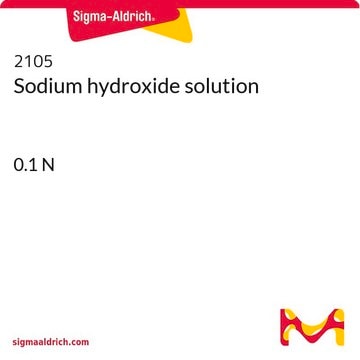2104
Hydrochloric acid
c(HCl) = 0.1 mol/l (0.1N), endotoxin free
Synonyme(s) :
Chlorure d’hydrogène solution
About This Item
Produits recommandés
product name
Acide chlorhydrique solution, volumetric, 0.1 M HCl (0.1N), endotoxin free
Pression de vapeur
190 mmHg ( 25 °C)
Niveau de qualité
Forme
liquid
Qualité
endotoxin free
volumetric
Concentration
0.1 M HCl (0.1N)
pH
<1
Point d'ébullition
100 °C (lit.)
Densité
1.2 g/cm3 at 25 °C
Chaîne SMILES
Cl
InChI
1S/ClH/h1H
Clé InChI
VEXZGXHMUGYJMC-UHFFFAOYSA-N
Vous recherchez des produits similaires ? Visite Guide de comparaison des produits
Catégories apparentées
Application
- sym-Trisubstituted 1,3,5-Triazine Derivatives as Promising Organic Corrosion Inhibitors for Steel in Acidic Solution.: This study explores the use of trisubstituted triazine derivatives in hydrochloric acid solutions to inhibit steel corrosion. The findings highlight the potential of these compounds in industrial applications where corrosion prevention is critical (El-Faham et al., 2016).
- Melt-Extruded Eudragit FS-Based Granules for Colonic Drug Delivery.: This research examines the development of drug delivery systems using hydrochloric acid solutions to process granules for targeted drug release in the colon, demonstrating a novel approach to pharmaceutical formulations (Zhang, 2016).
- Effect of molecular structure of aniline-formaldehyde copolymers on corrosion inhibition of mild steel in hydrochloric acid solution.: The study investigates how different molecular structures of aniline-formaldehyde copolymers affect their efficiency as corrosion inhibitors in hydrochloric acid solutions, providing insights for materials science and industrial applications (Zhang et al., 2015).
- Preparation and characterization of new solid-phase microextraction fibers obtained by sol-gel technology and zirconium oxide electrodeposited on NiTi alloy.: This paper details the creation and testing of new solid-phase microextraction fibers using hydrochloric acid in the preparation process, highlighting advancements in analytical chemistry techniques (Budziak et al., 2008).
- Polyaniline-uricase biosensor prepared with template process.: The research describes the fabrication of a polyaniline-uricase biosensor using hydrochloric acid in the template process, offering new possibilities for biosensor technology and its applications in medical diagnostics (Kan et al., 2004).
Produit(s) apparenté(s)
Mention d'avertissement
Warning
Mentions de danger
Conseils de prudence
Classification des risques
Met. Corr. 1
Code de la classe de stockage
8B - Non-combustible corrosive hazardous materials
Classe de danger pour l'eau (WGK)
nwg
Point d'éclair (°F)
Not applicable
Point d'éclair (°C)
Not applicable
Certificats d'analyse (COA)
Recherchez un Certificats d'analyse (COA) en saisissant le numéro de lot du produit. Les numéros de lot figurent sur l'étiquette du produit après les mots "Lot" ou "Batch".
Déjà en possession de ce produit ?
Retrouvez la documentation relative aux produits que vous avez récemment achetés dans la Bibliothèque de documents.
Notre équipe de scientifiques dispose d'une expérience dans tous les secteurs de la recherche, notamment en sciences de la vie, science des matériaux, synthèse chimique, chromatographie, analyse et dans de nombreux autres domaines..
Contacter notre Service technique



